Funding Circle Review 2021 – Is it a Good Investment?
Peer to peer lending is a multi-billion industry and still growing.  This growth is accelerated by the flexibility and convenience it offers over the traditional banking system. Today, P2P platforms are the go-to places for personal loans, but what about the business loans niche that has been inadequately served by banks and even by P2P platforms?
This growth is accelerated by the flexibility and convenience it offers over the traditional banking system. Today, P2P platforms are the go-to places for personal loans, but what about the business loans niche that has been inadequately served by banks and even by P2P platforms?
In this Funding Circle review, we examine a platform dedicated to business loans and the pros and cons of borrowing and investing through it. Read on.
-
-
What is Funding Circle?
Funding Circle is a peer-to-peer lending company that was founded in August 2010 in the United Kingdom. It is credited as the first lender to use the peer-to-peer lending model for business funding in the UK. The company connects established businesses in need of funding to investors through its platform and earns money by them a service fee.
The company later merged with Endurance Lending Network to expand its business to the US in 2013. Today, it operates in the UK, Germany, Netherlands, the US and it is planning to expand to Canada later this year. Funding Circle is listed on the London Stock Exchange and is one of the platforms with the highest loan originations in the world.
In this review, we are going to focus on Funding Circle US
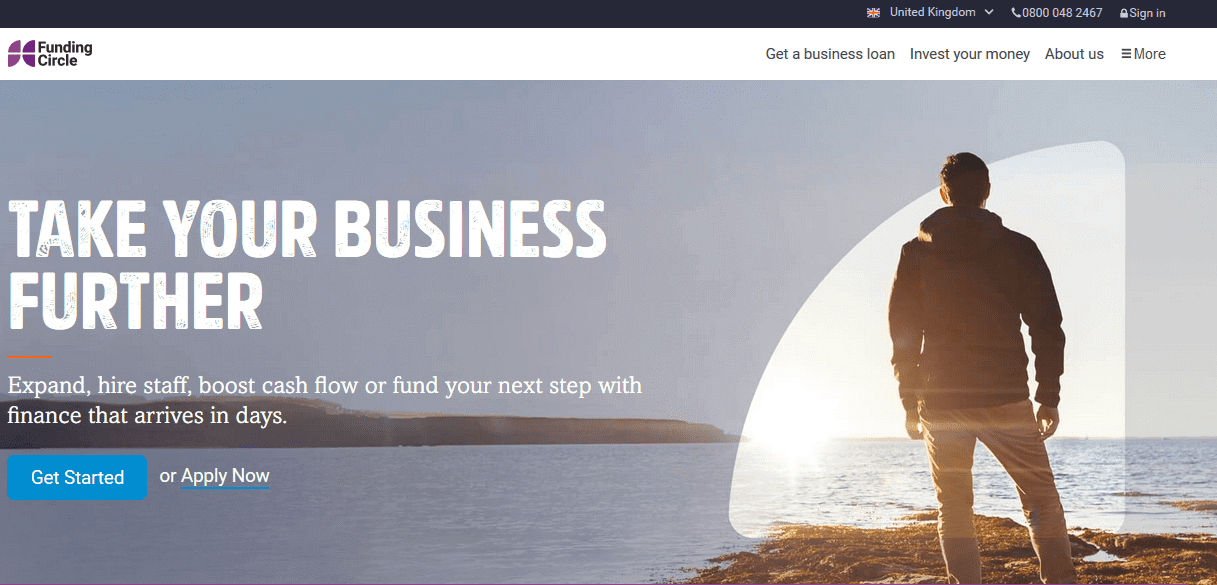 Funding Circle Pros
Funding Circle ProsFor Investors
- Secured loans – reduces the risk of losing your entire investment in case of default
- Automatic investments for those who want a hands free experience
- Rigorous assessment that reduces the number of bad loans
For borrowers
- Fast approval of loans
- Fixed interest rates
- Variable term lengths (1 – 5 years)
- No prepayment penalties
- Lower rates compared to other lenders
Funding Circle ConsFor Investors
- No secondary market in the US platform
- High 1% annual service fee
- High minimum investment of $25,000 and $500 per note (compared to £1000 for the UK platform)
- Investment in the US is only open to accredited investors
For Borrowers
- High interest and fees
- Stringent borrower requirements, compared to other lenders
- It is not for start-ups or recently launched businesses
- It’s fast but still not the fastest approval time in the market.
How Funding Circle works
Similarly to other p2p platforms like LendingClub, Funding Circle is a peer-to-peer lender that connects creditworthy businesses in need of funds to individual and institutional investors on their platform. It evaluates the borrower, and if approved, the loan is presented to investors who invest in parts of the loan. Funding Circle offers medium-term loans with the term lengths ranging between six months and five years.

Funding Circle earns by charging the borrower an origination fee of between 3.49% and 6.99% and a 1% annual fees based on the unpaid principal balance is deducted from the borrower’s repayment. No other fee is charged to the investor.What Types of loans are offered by Funding Circle?
Funding Circle only offers installment loans to established businesses that require financing in a short period. The loan term lengths of the loans range from six months to five years. Businesses can obtain loans between $25,000 and $500,000 on the US platform with rates starting from 4.99% up to 29.9% based on the businesses creditworthiness.
Most of the businesses in the company’s US market borrow to boost cash flow, buy new equipment, grow the business size, refurbish premises, cover one-off costs or hire extra staff. However, most new businesses do not qualify for the platform’s loans as it requires a minimum of 2 years in business.
Funding Circle Loan requirements
Funding Circle’s US business loans are secured although the company does not specify the type of collateral it requires. Instead, it files a lien on your general business assets. For loans under $300,000, the company requires your recent personal returns, two recent business tax returns, and six recent business bank statements. For loans over $300,000, Funding circle will need your business’s income statements, balance sheet, outstanding business loans and credit worksheets in addition to the documents required for under $300,000 loans.
Funding Circle Loan application process
To get a business loan, you have to apply online providing details such as the amount you wish to borrow, legal business name, majority owner’s name and contact details in the first step.
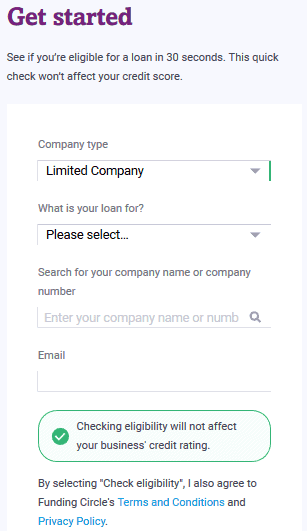
The second step is to provide business details, including industry type, state, number of employees, what you intend to use the funds for, business location, outstanding debt, and business ownership.
In the majority owner’s profile, you are required to provide legal identification in the form of your social security number, address and whether you own or rent your home.
The last step is to upload the required documents, tax returns for the last two years, personal tax returns and operating bank statements. After submitting the application, you are assigned a personal account manager who calls you about the next steps or for additional details or documents about your business.Funding Circle checks your application and sends you back their offer within a day, including your origination fee and interest rates. If you accept the offer, you will receive the funds within a few days. The loan application takes about 10 minutes and the whole process about ten days or less.
The interest rate offer is determined by your creditworthiness, how long you have been in operation, business strength, industry type and the loan term length.
Do I qualify for a Funding Circle loan?
To be eligible for a loan on the platform, you must:
- Be at least 24 months old
- Have no bankruptcies over the last seven years
- Have no tax liens over the last 10 years
- A credit score of 620 and above
The average funded borrower on the platform has a credit score of 700. Funding Circle only deals with established businesses although it does not have a minimum annual revenue requirement but, you will need to produce documentation proving a solid business operation.
Funding Circle does not lend to non-profit organizations, gambling businesses, marijuana dispensaries, weapon manufacturers, pornography and businesses in speculative real estate.
Investing in Funding Circle
Hundreds of individuals and institutions invest in the loans originated by Funding Circle in the US. On 1st March, the platform announced that it had facilitated the funding of loans worth more than $2 billion to small businesses in the US since 2013, a number greater than what almost 98% of FDIC insured banks facilitated in the same period.
By investing on the platform, you are purchasing interests in the loans originated by Funding Circle, or notes.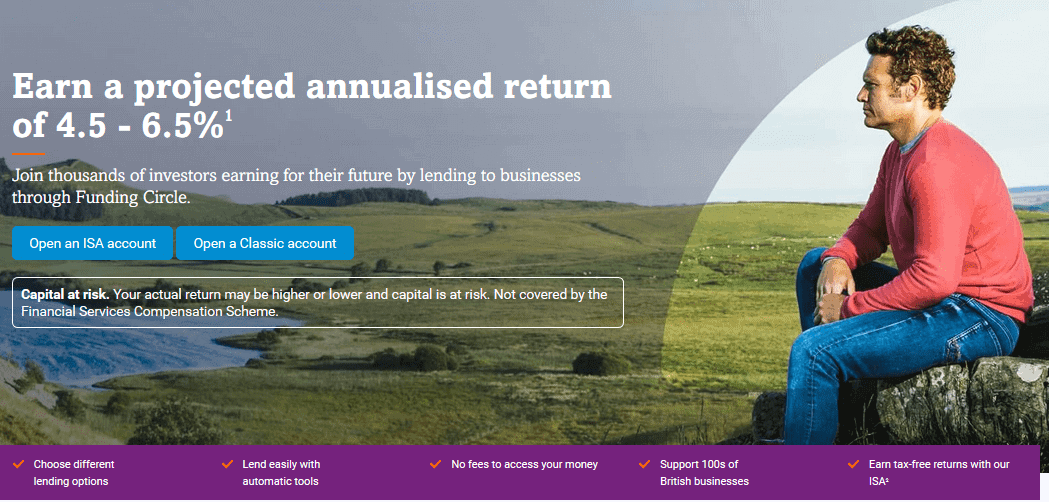
Note that you hold the entirety of the risk and you cannot make a claim against the company if you lose your money from defaults.
How to start investing in Funding Circle
The first step towards being an investor on any p2p platform is opening an account. A form requiring you to fill in your name and working email address appears. The next step is choosing the account type you want to open, either an individual investor, single member entity/Corp/trust or LLC, Entity/Corp/trust or LLC or an Individual Retirement Account (IRA).

To be able to proceed, you must prove that you are an accredited investor. An accredited investor according to Securities and Exchange Commission is one whose income exceeds $200,000 or $300,000 together with a spouse in the last two years and expects the same for the current year. Or, one with a net worth of over $1 million, alone or with a spouse. It also applies to trusts with over $5 million in assets or one where all equity owners are accredited investors.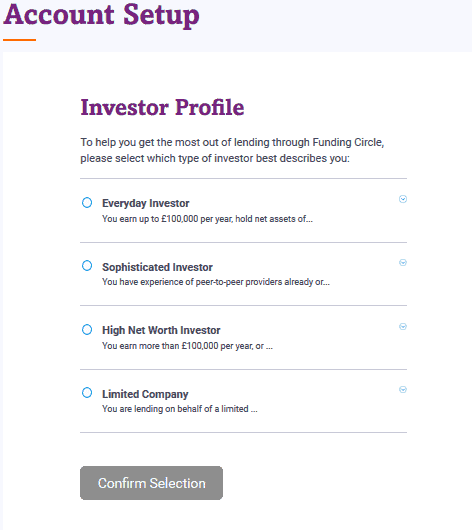
Funding Circle will send you a verification email after which you will be required to create your profile and upload identification documents.
Once you have opened an account and Funding Circle has verified that you are an accredited investor, you will be required to transfer a minimum of $25,000 into your account.Choosing investments on Funding Circle
The platform allows you to choose notes individually or using the Auto Invest tool. The minimum investment per note is $500 and you cannot invest 2% of your entire investment on one note.
The investor portal enables you to see details including the industry it is in, location, number of employees, and years it has been in operations. You can also view their financial details including credit score details and existing debts.Automated investing
The platform has an auto invest tool that allows you to specify your risk appetite and loan terms of the loans you would like to purchase. By using the auto invest tool, all repayments and available funds in your account will be reinvested as soon as they reach the minimum investment amount of $500.
This is to help you diversify your portfolio and allow your interest to compound. The auto invest tool can be turned on or off anytime. If you prefer to choose the investments manually.Risks associated with investing in Funding Circle
Like every other peer-to-peer lending platforms, Funding Circle investors stand the risk of losing their investments. You should be aware of these risks:
- Delinquency and default – sometimes the business may miss a payment or not pay the loan entirely despite Funding Circle’s rigorous assessment. The loans are secured but you may still lose part of your investment when no recovery can be done. To discourage borrowers from missing payments, Funding Circle charges a late fee of 10%, and when there is no contact with the borrower, the loan defaults after three months.
- Interest risk – Funding Circle allows early repayment of the loans and does not charge borrowers for that. This means you will not earn the interest rate you would have if the loan was repaid at the end of the term. Instead, the repayments will be invested into other notes by the auto invest tool.
- Liquidity risk – Funding Circle does not offer a secondary market for US investors. You should, therefore, invest if you intend to hold the loan until maturity.
How Funding Circle minimizes risk for Investors
While it is not a guarantee that there will be no bad debt, Funding Circle tries to minimize the investor risk by:
- Diversification – the platform requires a minimum of $25000 initial investment and you cannot invest more than 2% of the total funds into one note. This reduces your exposure if the note defaults.
- Strict requirements and assessment of loans – Funding Circle ensures that only businesses that pass their rigorous credit assessment make it to funding. Therefore, only creditworthy businesses are approved, however, this cannot guarantee that the loan will be repaid.
How much can I earn on Funding Circle?
Your returns depend on the risk appetite, how well you diversify your investments and amount of bad debts. Investors on the platform earn annual returns of 5% to 7% according to the platforms historical annual returns calculations. However, the platform offers loans with up to 27.79%. The interest rates are before the 1% service fee.
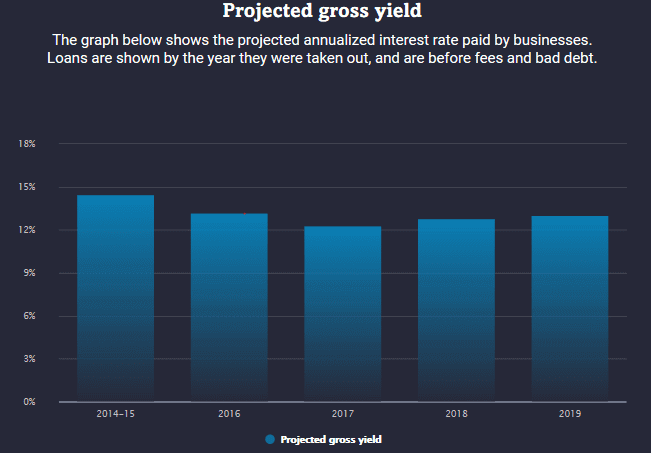
The platform charges a 5% late fee on late repayments with 50% of the late fee going to the investor. Funding Circle does not charge any other fees to the investor but bank transactions such as deposit and withdrawals may have charges.The earnings from peer to peer lending are taxable but the platform does not withhold any taxes, it will, however, provide you with IRS Form 1099. Consult your tax professional for taxation requirements.
Who is eligible to be an investor?
To invest in Funding Circle you must:
- Be above 18 years and have a social security number
- Be an accredited individual or institutional investor
- Have a minimum of $25,000 for the initial investment.
Funding Circle Review: Verdict
Funding Circle is a great peer-to-peer lending platform with years of experience and an amazing portfolio. They have great customer service and support system. The application process may take longer than other p2p platforms but it is still shorter than applying for a bank loan.
Businesses that can get approved for a Funding Circle loan can get better rates from banks, but the quick access to funds may be worth the trade-off. Investments, on the other hand, are exclusive to high net worth individuals.
Glossary of Investment Terms
 Bonds
BondsA bond is a loan made to an organization or government with the guarantee that the borrower will pay back the loan plus interest upon the maturity of the loan term. It can be advanced to the national government, corporate institutions, and city administration. It is an investment class with a fixed income and a predetermined loan term.
 Mutual Fund
Mutual FundA mutual fund is a professionally managed investment vehicle that pools together funds from numerous investors and invests it in such securities as stocks, bonds, and other money market instruments. They are headed by portfolio managers who determine where to invest these funds. They are highly regulated and invest in relatively low-risk money markets and in turn post lower rates than other aggressive managed funds.
 P2P Lending
P2P LendingPeer-to-peer lending (p2p lending) is a form of direct-lending that involves one advancing cash to individuals and institutions online. A P2P lending platform, on the other hand, is an online platform connecting individual lenders to borrowers.
 Bitcoin
BitcoinBitcoin is the legacy cryptocurrency developed on the Bitcoin Blockchain technology. It is a new form of money primarily developed to solve some of the inherent challenges associated with fiat currencies like inflation and over-production. It is virtual (online) cash that you can use to pay for products and services from bitcoin-friendly stores.
 Index Funds
Index FundsAn index fund refers to the coming together of individuals to pool in funds that are then invested in the stock and money markets by professional money managers. The only difference between an index fund and a mutual fund is that the index fund follows a specific set of rules that track specific investments and index stocks.
 ETFs
ETFsAn Exchange-traded fund refers to an investment vehicle that is publicly traded in the stock exchange markets – much like shares and stocks. The fund is expert-managed and its portfolio comprises of such investment products as stocks, bonds, commodities, and more money market instruments like currencies.
 Retirement
RetirementRetirement refers to the time you spend away from active employment and can be voluntary or occasioned by old age. In the United States, the retirement age is between 62 and 67 years.
 Penny Stocks
Penny StocksPenny Stocks refer to the common shares of relatively small public companies that sell at considerably low prices. They are also known as nano/micro-cap stocks and primarily include any public traded share valued at below $5.
 Real Estate
Real EstateReal Estate can be said to be the land and buildings on a given property as well as other rights associated with the use of the property like the air rights and underground rights. Real estate can be either commercial if the land, property, and buildings are used for business purposes or residential if they are used to non-business purposes – like building a family home.
 Real Estate Investment Trust (REIT)
Real Estate Investment Trust (REIT)REITs are companies that use pooled funds from members to invest in income-generating real estate projects. While a REIT may specialize in one real estate niche, most diversify and invest in as many high-income real estate projects as possible. They are especially interested in commercial real estate projects like warehouses, prime office buildings, residential apartments, hotels, timber yards, and shopping malls.
 Asset
AssetAsset simply refers to any resource of value or a resource that can be owned and controlled to produce positive value by an individual or business.
 Broker
BrokerA broker is an intermediary to a gainful transaction. It is the individual or business that links sellers and buyers and charges them a fee or earns a commission for the service.
 Capital Gain
Capital GainCapital gains refer to the positive change in the price of a capital asset like shares and stock, bonds or a real estate project. It is the difference between the current selling price of the asset and its lower original buying price and it is considered a taxable income.
 Hedge Fund
Hedge FundA hedge fund is an investment vehicle that pools together funds from high net worth individuals and businesses before having professional money managers invest it in highly diversified markets. The difference between mutual and hedge funds is that the later adopts highly complicated portfolios comprised of more high-risk high-return investments both locally and internationally.
 Index
IndexAn index simply means the measure of change arrived at from monitoring a group of data points. These can be company performance, employment, profitability, or productivity. Observing a stock index, therefore, involves measuring the change in these points of a select group of stocks in a bid to estimate their economic health.
 Recession
RecessionA recession in business refers to business contraction or a sharp decline in economic performance. It is a part of the business cycle and is normally associated with a widespread drop in spending.
 Taxable Accounts
Taxable AccountsTaxable Account refers to any investment account that invests in shares and stocks, bonds and other money market securities. The account is offered by a brokerage company and you are obliged to report and pay taxes on the investment income each year.
 Tax-Advantaged Accounts
Tax-Advantaged AccountsA tax-advantaged account refers to savings of investment accounts that enjoy such benefits as a tax exemption or deferred tax payment. Roth IRA and Roth 401K are examples of tax-exempt accounts whose contributions are drawn from after-tax incomes with the yields generated from investing funds therein being tax-exempt. Traditional IRA, 401K plan and college savings, on the other hand, represent tax-deferred accounts. Their contributions are deductible from your current taxable incomes but you get to pay taxes on their accrued incomes.
 Yield
YieldYield simply refers to the returns earned on the investment of a particular capital asset. It is the gain an asset owner gets from the utilization of an asset.
 Custodial Accounts
Custodial AccountsA custodial account is any type of account that is held and administered by a responsible person on behalf of another (beneficiary). It may be a bank account, trust fund, brokerage account, savings account held by a parent/guardian/trustee on behalf of a minor with the obligation to pass it to them once they become of age.
 Asset Management Company
Asset Management CompanyAn Asset Management Company (AMC) refers to a firm or company that invests and manages funds pooled together by its members. Like mutual or hedge funds, the AMC creates diversified investment portfolios that comprise of shares and stocks, bonds, real estate projects, and other low and high-risk investments.
 Registered Investment Advisor (RIA)
Registered Investment Advisor (RIA)A registered investment advisor is an investment professional (an individual or firm) that advises high-net-worth (accredited) investors on possible investment opportunities and possibly manages their portfolio.
 Fed Rate
Fed RateThe fed rate in the United States refers to the interest rate at which banking institutions (commercial banks and credit unions) lend - from their reserve - to other banking institutions. The Federal Reserve Bank sets the rate.
 Fixed Income Fund
Fixed Income FundA fixed-income fund refers to any form of investment that earns you fixed returns. Government and corporate bonds are prime examples of fixed income earners.
 Fund
FundA fund may refer to the money or assets you have saved in a bank account or invested in a particular project. It may also refer to the collective basket of resources pooled from different clients that are then invested in highly diversified income-generating projects.
 Value Investing
Value InvestingValue investing is the art of using fundamental analysis to identify undervalued shares and stocks in the market. It involves buying these shares at the current discounted prices and hoping that a market correction pushes them up to their intrinsic value effectively resulting in massive gains.
 Impact Investing
Impact InvestingImpact investing simply refers to any form of investment made with the aim of realizing financial returns while positively impacting the society, environment or any other aspect of life in the process. Investment in solar projects and green energy, for instance, posts profits and helps conserve the environment.
 Investing App
Investing AppAn investment App is an online-based investment platform accessible through a smartphone application. It lets you save and invest your funds in a preset portfolio that primarily consists of shares and stocks, bonds, ETFs, and currencies based on your risk tolerance.
 Real Estate CrowdFunding
Real Estate CrowdFundingReal Estate crowdfunding is a platform that mobilizes average investors – mainly through social media and the internet – encourages them to pool funds, and invests them in highly lucrative real estate projects. It can be said to be an online platform that brings together average investors and lets them enjoy real estate projects previously preserved for high net worth and institutional investors.
FAQs
Can I get my money back before the loan matures?
No, the platform does not offer a secondary market in the US. You have to hold the investment until maturity.
Is Funding Circle regulated?
Funding Circle is registered and regulated by Financial Industry Regulatory Authority (FINRA) as a broker for the notes. It is also regulated by the Securities and Exchange Commission and by each state it operates in. It is also regulated directly by the California Department of Business Oversight and the Federal Trade Commission on the federal level.
Does Funding Circle withhold taxes?
No, it does not withhold any taxes.
Is there a prepayment penalty?
No, the platform does not charge you for paying your loan off early. You also pay interest for the time you hold the loan.
Can I invest in loans from other markets?
No, US investors can only invest in US loans, same case to UK, Germany and Netherlands.
Are the Funding Circle loans secured?
Yes, all loans in the US market are secured by a non-real estate collateral. The collateral can be in the form of equipment, vehicles or inventory.
Peer 2 Peer – A-Z Directory
George Gacheru
George Gacheru is a finance and tech writer and currently working on a Masters in Business Information. He has developed a keen interest in all things finance and technology and loves to write about it.View all posts by George GacheruWARNING: The content on this site should not be considered investment advice. Investing is speculative. When investing your capital is at risk. This site is not intended for use in jurisdictions in which the trading or investments described are prohibited and should only be used by such persons and in such ways as are legally permitted. Your investment may not qualify for investor protection in your country or state of residence, so please conduct your own due diligence. Contracts for Difference (“CFDs”) are leveraged products and carry a significant risk of loss to your capital. Please ensure you fully understand the risks and seek independent advice. This website is free for you to use but we may receive commission from the companies we feature on this site.
Copyright © 2025 | Learnbonds.com
We use cookies to ensure that we give you the best experience on our website. If you continue to use this site we will assume that you are happy with it.Scroll Up

